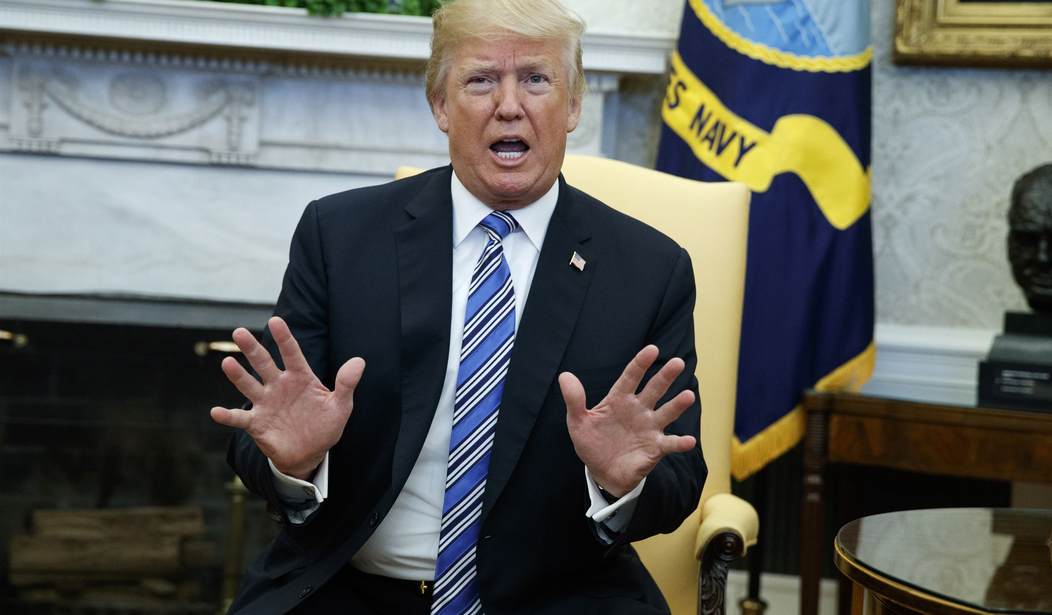When President Trump announced he would protect American jobs by imposing tariffs on foreign-made steel and aluminum, naysayers of both parties rushed to the nearest microphone or TV camera. Pundits and politicians alike pretended to be “shocked, shocked” that Trump meant what he said as a candidate, and that he actually means to deliver what he promised during the campaign.
The Swamp, in short, is not happy. But cheers rose from the manufacturing belt that runs through the states that put Trump in the White House: Pennsylvania, Ohio, Michigan, Indiana, Wisconsin, and Iowa.
“This is a good thing for the steel industry and for our country,” said Tim Timken, the fifth-generation leader of TimkenSteel, which has 3,000 employees in Ohio. “We’re standing up to our foreign competition and essentially saying enough is enough,” he added.
While foreign lobbyists warned of a new “trade war” in which other countries retaliate against the United States, U.S. Steel CEO David Burritt pointed out that “We are, and have been, in a trade war for decades. Countries which have economically prospered by creating our current trade imbalance will face repercussions to their own economies if they choose the path of retaliation.”
Peter Navarro, director of the White House Office of Trade and Manufacturing Policy, debunked the notion that the United States could lose a trade war with Europe or Asia. “We are the most lucrative and biggest market in the world. We have the lowest tariffs in the world, we have the lowest non-tariff barriers, we are the free-tradingest nation in the world."
“And what do we get for that?” Navarro asked. “We get every year a half-trillion-dollar trade deficit that transfers our wealth to other countries and basically offshores our jobs and our factories. All we are asking for is fair and reciprocal trade.”
Recommended
The rest of the world wants unlimited access to the American consumer without complying with American regulations and without paying American taxes. “Under my administration,” Trump boasted in his speech to CPAC last month, “the era of economic surrender is over.”
“We’re renegotiating trade deals that are so bad, whether it’s NAFTA, whether it’s the World Trade Organization, which created China. China has been like a rocket ship ever since, and last year we had almost a $500 billion trade deficit with China” ? money that finances the growing Chinese military.
Critics are exaggerating the cost to consumers by adding a tax to foreign-made steel and aluminum. Commerce Secretary Wilbur Ross ran the numbers and found that the aluminum tariff would add just six-tenths of a cent to the cost of a soup or beer can, while the steel tariff would add about $175 to the cost of a $35,000 car.
Tariffs are much like the out-of-state tuition that state colleges charge students whose families have not supported the college through taxes. Most state colleges require out-of-state students to pay more, and most people fully support that sensible requirement.
Similarly, tariffs help level the playing field between offshore manufacturers that escape the extra burdens and costs of operating a business in America and providing jobs to Americans. Requiring those foreign companies to pay more for the privilege of selling to American consumers is perfectly logical given how the foreigners have not been paying American taxes or complying with our regulations.
The resistance to tariffs comes from the same never-Trumpers who assured us that Trump could never be nominated or elected. Peter Navarro noted that nearly all the other presidential candidates opposed Trump on trade, but “guess what? He beat them.”
Thirty years ago, when Donald Trump was in his early 40s, his views on trade were much the same as they are now. He told Larry King that he was “tired of watching other people ripping off the United States.” He told Oprah, “I’d make our allies pay their fair share.”
Trump told Letterman that nations such as Japan have “totally taken advantage of the country. I’m talking about the [trade] deficits. They talk about free trade [but] they dump the cars and everything else.”
Democratic Sen. Joe Manchin, who supports the Trump tariffs, observed that “Free trade hasn’t worked well for West Virginia.” Maybe that explains why Trump carried West Virginia with 69 percent of the popular vote, a whopping 42-point margin over Hillary Clinton in that formerly Democratic state.
Just as entrenched politicians in D.C. have blocked Trump’s efforts to build a Wall, they also protest too much at his effort to impose a few tariffs. Yet the approach of a tariff-less society has been a catastrophic failure for the American worker, so it is time to try the approach that originally made our country great.
John and Andy Schlafly are sons of Phyllis Schlafly (1924-2016) whose 27th book, The Conservative Case for Trump, was published posthumously in 2016.

























Join the conversation as a VIP Member